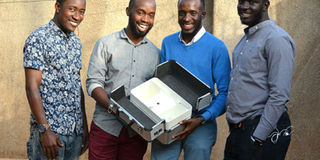Youth on a mission to make malaria testing easy

Developers of Matibabu malaria testing device display a sample of their magnetic kit. Photo by Esther Oluka
What you need to know:
- After graduating, many youth start looking for jobs instead of using the knowledge gained to start their own business and employ others. With Matibabu, a group of youth have come together to build a device that tests for malaria without the need for blood samples. They speak to Esther Oluka about their journey so far, challenges and future plans.
Across the country, in many health facilities, malaria is diagnosed using blood tests after a patient is suspected of having the disease. Usually, the extracted blood is carefully examined in the laboratory under a microscope to check for plasmodium parasites that cause malaria.
For many years, this has been one of the effective methods of identifying malaria in patients. This is however likely to change if a group of six young men have anything to do about it.
The group of six developed a testing device dubbed Matibabu, which does not require blood samples in order to test for malaria.
“Inside it (the testing device) is a compartment where an individual can place one of their fingers. With the help of magnetic and light sensors, the results will then be conveyed on one’s mobile phone showing whether one has malaria or not,” says Joshua Busingye, one of the team members.
The device has power cables that must be connected to a mobile phone in order for one to see the results.
“It is convenient and will enable individuals even test from home,” says Busingye.
The team has also made another device (with a similar appearance) suitable for clinics, hospital settings and health centres.
“It is just like the other one. The only difference is that it will require a blood sample. The device will have a small plastic container where the blood sample is put before being placed back inside the testing device,” Busingye says, adding, “The power cables from the device may be connected to either a mobile phone or desktop where the results will be conveyed.”
Busingye emphasises that the testing devices will use the same technology current malaria testing kits use with the only difference being that one will not require blood samples while testing for malaria while the other will necessitate the blood samples.
The team
The six are Brian Gitta, 26, Joshua Busingye, 25, Shafik Sekitto, 25, Morris Atwine, 24, Simon Lubambo, 29, Josiah Kavuma, 27. While Gitta, Busingye, Sekitto and Atwine were all present during the interview at their offices in Ntinda, Kampala, they delegated Busingye to speak on their behalf.
Meanwhile, the other two team members, Lubambo and Kavuma were away attending to other official duties outside the office. Busingye says they started working on the device about five years ago when they were all studying at Makerere University. “There are four of us who graduated with degrees in Computer Science while the other two studied electrical engineering and we all graduated in 2016,” Busingye says.
Challenges in making the innovation
The biggest issues the team continues to face is limited resources and funding. “It is not easy getting some of the components required for the device. Some of them are not even readily available in the market,” Busingye says, adding, “The money being injected into this innovation is also limited, the reason we have been relying mostly on sponsors in order to do the work.”
To ease work, members play different roles on the team. Gitta is the team leader, Sekitto handles the business aspect of things, and Atwine handles communications while Busingye is the lead researcher.
Recognition
The team has previously participated in a number of competitions and in return have been recognised and awarded numerous accolades and awards. Just recently, they emerged winners of the African prize for engineering Innovation organised by the Royal Academy of Engineering in the United Kingdom.
The awards are intended to stimulate, celebrate and reward innovation and entrepreneurship in Sub-Saharan Africa. They were awarded a cash prize of £25,000 (about Shs127 million).
Why the device is not yet on the market?
Individuals enthusiastic about using the product will have to wait as it is not yet on the market. The product is still being tested and its design continuously improved. Once this is done, the clinical trials will then begin.
Team member experiences
“This has been an educative journey for me. I have learnt a number of things including how to handle partners and run a company. Most importantly, the lesson from this whole experience is to be resilient and chase after your dream.”
Brian Gitta, 26, team leader
“I have personally been able to engage with different stakeholders and got great exposure in terms of knowledge and travel. I am also happy that as a team, we have been given different awards and prizes from both within and out of the country. “
Joshua Busingye, 25
“I have a background in computer science and on the team, I attend to the business side of things for instance, developing the business plan, models, and financial projections, among other things.”
Shafik Sekitto, 25
“I have learnt a number of things from the research we have been carrying out in the past years. This includes the different technological aspects involved in making the device.”
Morris Atwine, 24




